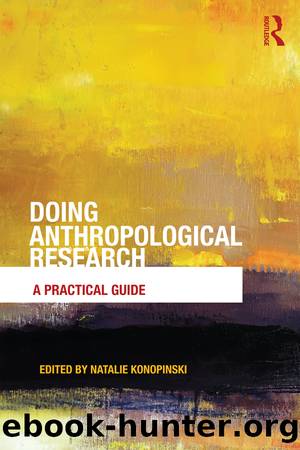Doing Anthropological Research by Natalie Konopinski

Author:Natalie Konopinski [Konopinski, Natalie]
Language: eng
Format: epub
ISBN: 9780415697552
Barnesnoble:
Publisher: Taylor & Francis
Published: 2013-07-17T00:00:00+00:00
David Lanâs reasons for taking this structured approach may well relate to the unusual nature of his informants â ancestral spirits possessing mediums â and the very unclear âagenciesâ that involves. His was an attempt to stabilize and bring order to a complex social/cultural situation where it was not at all clear which or whose voice was speaking. Although Lanâs was a fairly unique research situation (but not hugely, for anthropology), and a fairly unusual approach (only partially successful), this example highlights an important point about interviews: not only can they be difficult to control, it can also be diffi-cult to be clear about the nature of the material being elicited. This returns us to Turnerâs point about separating participantsâ interpretations from those of the anthropologist, and again emphasizes the importance of taking into account âsignificant contextsâ. Interviews rarely provide âthick descriptionâ, and working out the âsignificant contextsâ of an interview â the matters being discussed, the manner of conversation, the manner of the informant/s and the interviewer, and the assumptions embedded in his or her questions/research agenda â is vital to the interpretation of the material being generated. This returns us to a) the importance of combining research methods; and b) the importance of reflexivity about the methods and techniques you use, and the cultural, social and political assumptions embedded within your research project. As a fieldworker you should reflect upon who you are choosing to interview and why, where and how you choose to do this, and what you tell an informant about the kind of information you are looking for. This is not only about refining your techniques in the field, although that is very important; it is also about the status of the knowledge that is generated.
Box 5.1
Participatory and multimodal research methods
The strengths of ethnographic research lie in the fact that it is socially embedded and interactive rather than detached and extractive. Since different people interact, learn and express themselves in different ways, to ensure that a variety of people have a voice in your research you may need to facilitate this using a variety of participatory methods. Whereas some people will gladly tell you their autobiographies or respond eloquently to your direct questions, most will not. You may, however, learn a lot by walking with them through a village or across a landscape; constructing a model with them to depict a remembered or anticipated scenario; playing a group audio-visual activity with them (such as putting together a video or photography show) that may lead to an informal focus group discussion; or getting them to show you their pictures or possessions. âParticipatoryâ means involving others collaboratively in generating knowledge. âMultimodalâ means using a variety of methods and sensory channels to do this. Inspired in part by anthropologyâs mix of methods and by the idea of non-extractive, collaborative learning, from the 1970s development planners developed a raft of methods for facilitating participatory learning and planning, under such labels as âRapid Rural Appraisalâ and âParticipatory Action Researchâ. Since
Download
This site does not store any files on its server. We only index and link to content provided by other sites. Please contact the content providers to delete copyright contents if any and email us, we'll remove relevant links or contents immediately.
Collaborating with Parents for Early School Success : The Achieving-Behaving-Caring Program by Stephanie H. McConaughy; Pam Kay; Julie A. Welkowitz; Kim Hewitt; Martha D. Fitzgerald(916)
Entrepreneurship Education and Training: The Issue of Effectiveness by Colette Henry Frances Hill Claire Leitch(684)
Materializing the Middle Passage by Jane Webster;(513)
Adding Value to Policy Analysis and Advice by Claudia Scott; Karen Baehler(500)
Race and American Political Development by unknow(493)
Sociological Perspectives of Health and Illness by Constantinos N. Phellas(493)
American Government and Politics Today by Steffen W. Schmidt Mack C. Shelley Barbara A. Bardes(488)
Human and Global Security : An Exploration of Terms by Peter Stoett(478)
Control Of Oil - Hardback by Kayal(476)
The Disappearance of Rituals: A Topology of the Present by Byung-Chul Han(422)
The Catholic Church and European State Formation, AD 1000-1500 by Jørgen Møller(406)
Advances in Child Development and Behavior, Volume 37 by Patricia J. Bauer(405)
The World According to China by Elizabeth C. Economy(391)
Theories of Counseling and Psychotherapy: A Case Approach by Nancy L. Murdock(383)
Application of classical statistics, logratio transformation and multifractal approaches to delineate geochemical anomalies in the Zarshuran gold district, NW Iran by unknow(377)
Left Is Not Woke by Susan Neiman(373)
Cross-Cultural Child Development for Social Workers by Lena Robinson(360)
Turkey's Relations with the West and the Turkic Republics: The Rise and Fall of the Turkish Model by Idris Bal(357)
Japan's Ainu Minority in Tokyo by Mark K. Watson(344)
